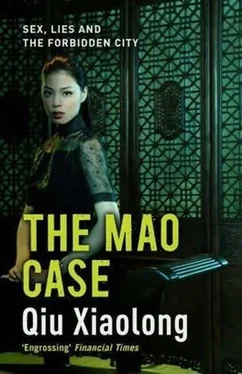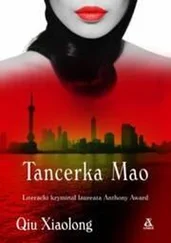Perhaps she had met people like him – more interested in her grandmother than in her. He knew better than to pressure her further. Besides, their conversation was disturbed by a loud Manila band and other louder diners, bantering tales about Madam Chiang, popping off the corks on expensive champagne like in the old days.
At the end of the meal, Jiao let him pay the bill like the ex-businessman he claimed to be. He didn’t really worry about the expense since the staggering bill might function, for once, as proof of his conscientious work. She told the waiter to box the leftovers – “For Mr. Xie, who doesn’t know how to cook.”
It was yet another confirmation of her being considerate of Xie. Parting outside the restaurant, they shook hands, and he had a feeling that her hand lingered in his for a moment. He saw a wistful smile flick across her face, as if touching a string, a peg in a half-forgotten poem.
But that wasn’t enough for Chief Inspector Chen, far from the breakthrough he needed, as he concluded as he got up from the bed.
He checked the cell phone first. No message. The information from Old Hunter so far, including the little indirectly from Detective Yu, didn’t appear promising.
So he decided to sally out onto his second front, a move first contemplated after his talk with Jiao in the garden, supported in his thoughts about Eliot’s poetry, and necessitated by his unsuccessful approach at the restaurant.
For the first attempt along that new front, Chen had actually done his homework. Before and after the dinner the previous day, he’d come up with a list of scholars’ works on Mao’s poetry. Though it could be said he had done some of the homework long before: He had read a number of books on the subject as early as his middle school years, when Quotations of Chairman Mao and Poems of Chairman Mao were his textbooks. Upon graduation, he had copied several lines in his diary as self-encouragement: The mountain pass may be made of iron, / but we are crossing it all over again, / all over again, / the hills stretching in waves, / the sun sinking in blood. After the Cultural Revolution, Chen, like many others, chose not to think too much about Mao or his poems. It was a page finally turned. Besides, Mao wrote in the traditional verse form, different from Chen’s free verse. Now, those poems of Mao’s came crowding back, fragmented more or less in the mind of the worn-out cop.
Most of Mao’s were “revolutionary,” at least in the official interpretations, including the poem composed for his second wife, Kaihui, and another poem written about a picture taken by his fourth wife, Madam Mao. The two poems were the only ones he could remember that had any relation to Mao’s personal life.
Some critics thought otherwise, perhaps. In traditional Chinese literary criticism, there was a time-honored tradition of suoying, i.e., an effort to find the true meaning of a work in the author’s life. Such an approach to Mao’s work might not have been practicable, for there was only the official version of his life. Still, a scholar in the field might know something inaccessible to Chen.
On the list of Mao poetry scholars Chen had made, some were so established that it was beyond Chen to attempt a quick contact, let alone a quick breakthrough; some of them were high in their Party positions, having worked with Mao, which also excluded the possibility of Chen’s learning anything from them; some had passed away; and some were too far away from Shanghai. So the only one approachable at the moment was Long Wenjiang, a “scholar” quite different from all others, but in Shanghai, and a member of the Writers’ Association too.
As a Mao poetry critic, Long had come to the fore during the Cultural Revolution. Not because of his academic studies but because of his class status as a worker. Having spent years collecting various annotations and interpretations of Mao poetry, he put them together into a single volume. The publication of the annotated edition immediately established him as a Mao scholar in the years when workers and peasants were encouraged to be the masters of the socialist society. He became a member of the Writers’ Association, as well as a “professional writer.”
But Long’s luck dipped after Mao’s death in 1976. For several years, few were interested in anything related to Mao. Mao scholars started working on different projects, like Tang or Song poetry, but Mao was the only subject Long knew anything about. Instead of giving up, he plodded on, betting on a revival of interest in Mao. The revival finally came with Mao’s becoming a brand name in the materialistic age, with Mao restaurants and Mao antiques and people collecting Mao badges and stamps for their potential value in the market. Plastic Mao images had even become potent charms for taxi drivers, dangling in front of windshields, supposedly effective against traffic accidents. Chen, too, had a lighter made in the shape of the Little Red Book – click it and a spark would shoot up, like Mao’s prediction about the red revolutionary flame sweeping over the world.
But there was no market value for Mao poetry in the collective revival. No publishing house showed any interest in Long’s revised edition, despite his passionate speeches and protests, both in and out of the Writers’ Association.
That was not the only trouble for Long. In the last few years, the Writers’ Association had suffered several cuts in their government funding. People began to talk about reforming the system of “professional writers.” In the past, those acknowledged as professional writers could get their monthly pay from the association until retirement, regardless of their publications. Now a contract period was suggested, with each member’s qualifications being examined and determined by a committee. Long was desperate, beginning to write something like short anecdotes – totally unrelated to Mao – in his effort to remain in the contract.
Chen happened to remember Long because of such a short piece published in Shanghai Evening. It was a vivid anecdote about river crabs, but “politically incorrect” in the judgment of the committee of the Writers’ Association, of which Chen was a member. So he dug the newspaper out and began rereading it. For a change, he added half a lemon and a spoonful of sugar into his tea.
Several years before the economic reform started in the eighties, my old neighbor, Aiguo, a Confucianist middle school teacher disappointed with the political banishment of Confucius from the classroom, began to develop a crab complex. He made a point of enjoying the Yangchen river crabs at least three or four times during crab season. His wife having passed away, his son having just started working in a state-run steel plant and dating a girl, Aiguo justified his one and only passion by making reference to well-known writers like Su Dongpo, a Song-dynasty poet, who declared a crab feast the most blissful moment of his life, “Oh that I could have crabs with a wine supervisor sitting beside me,” or like Li Yu, a Ming-dynasty scholar, who confessed that he wrote for the purpose of making the crab-money – his life-saving money. As an intellectual immersed in what “Confucius says,” Aiguo had to restrain himself from lecturing about the sage in public, but he followed Confucius’s ritualistic rules for crab-eating at home.
“Do not eat when the food is rotten; do not eat when it looks off-color; do not eat when it smells bad; do not eat when it is not properly cooked; do not eat when it is off season; do no eat when it is not cut right; do not eat when it is not served with the appropriate sauce… Do not throw away the ginger… Be serious and solemn when offering a sacrifice meal to one’s ancestors…” Aiguo would quote from the Analects by Confucius at the dinner table, adding, “It’s about the live Yangcheng crabs – all the necessary requirements for them, including a piece of ginger.”
Читать дальше












